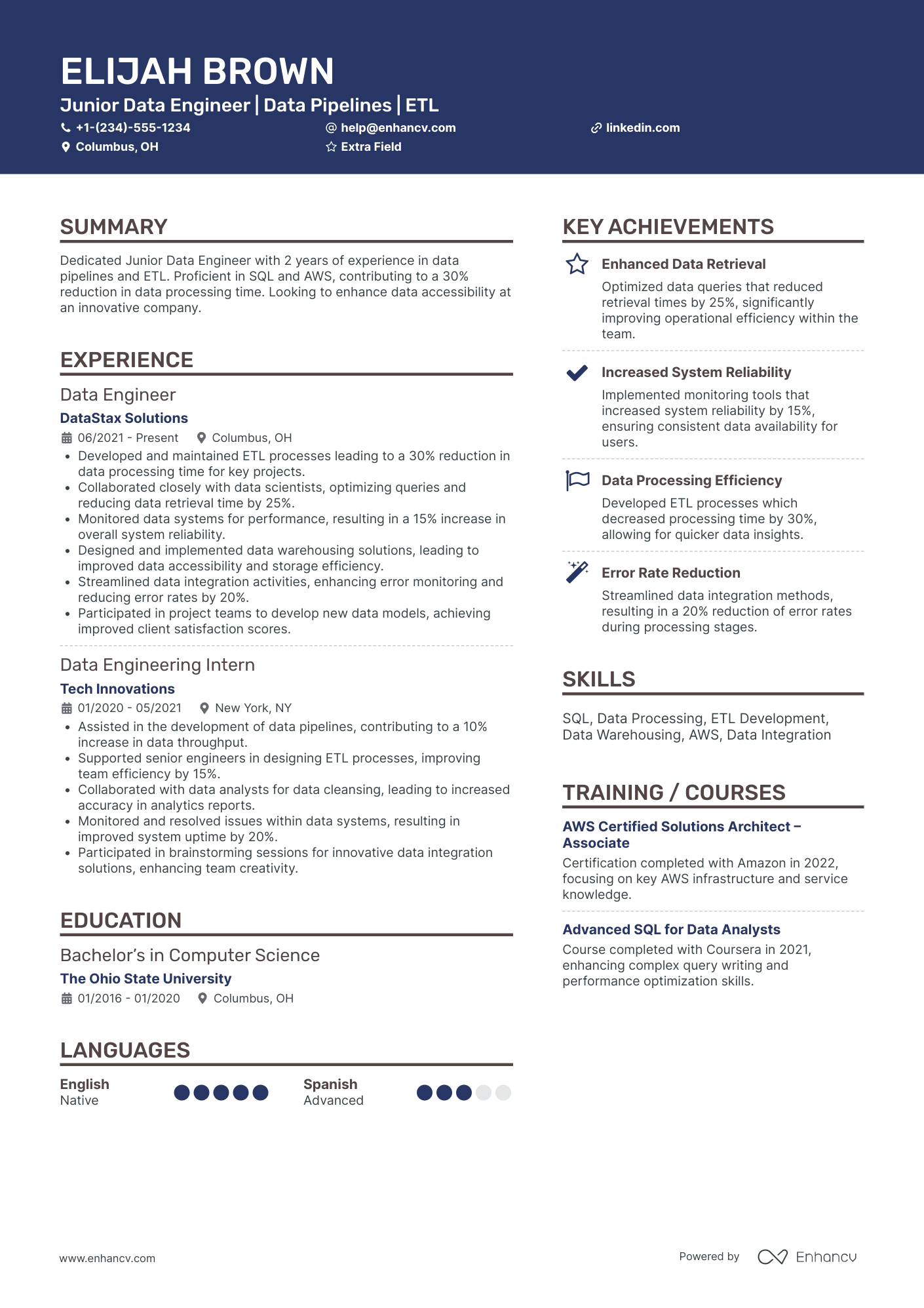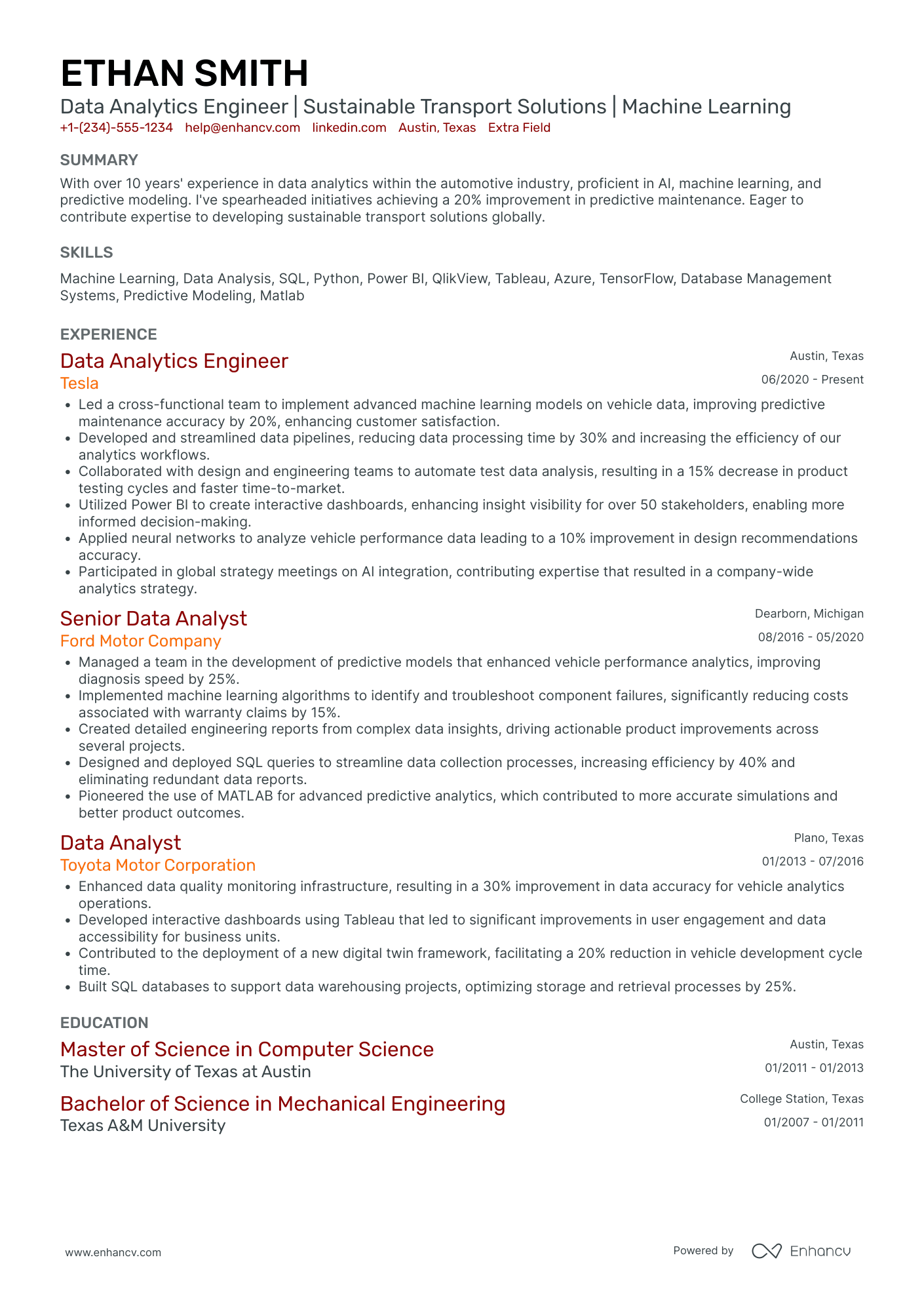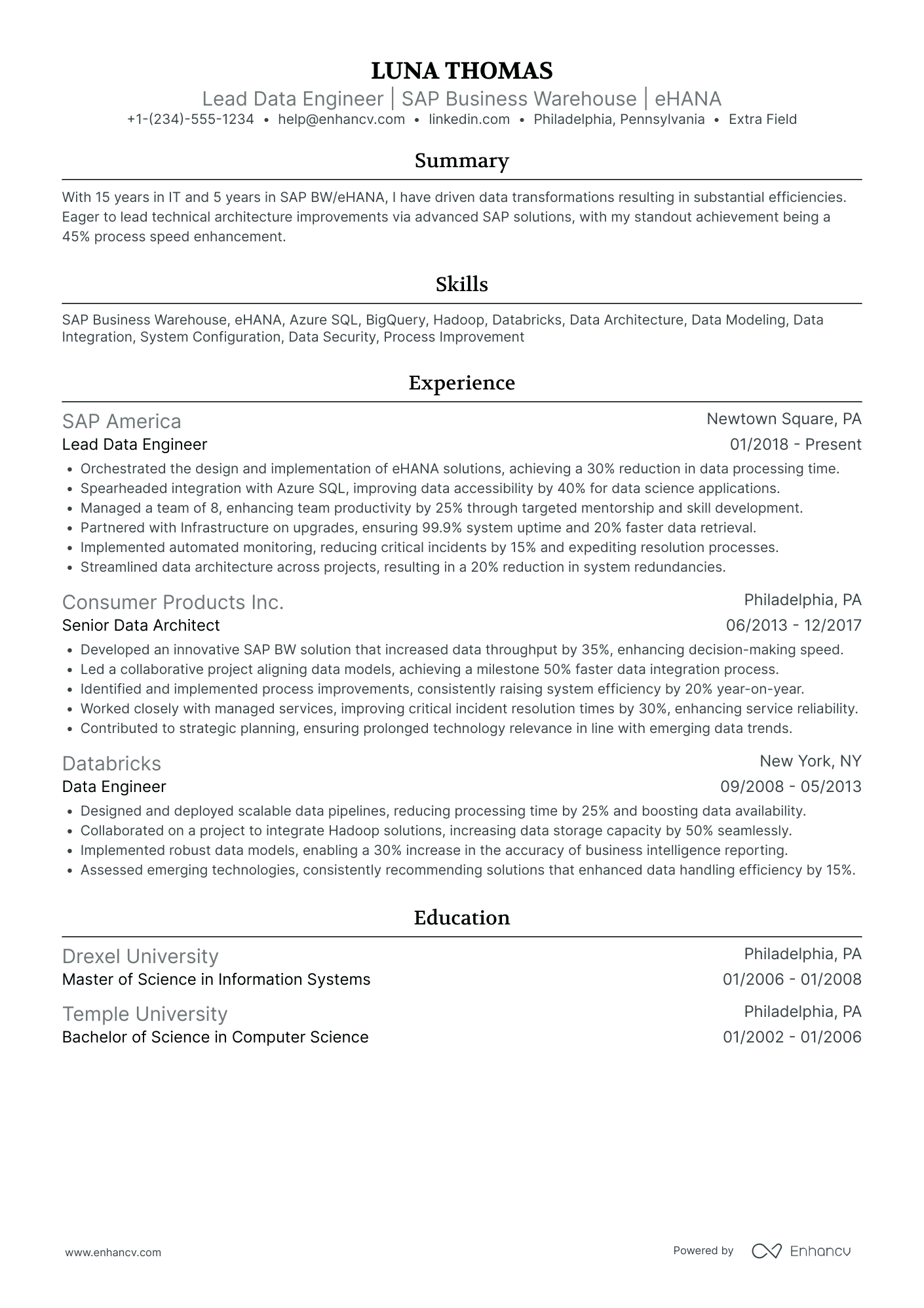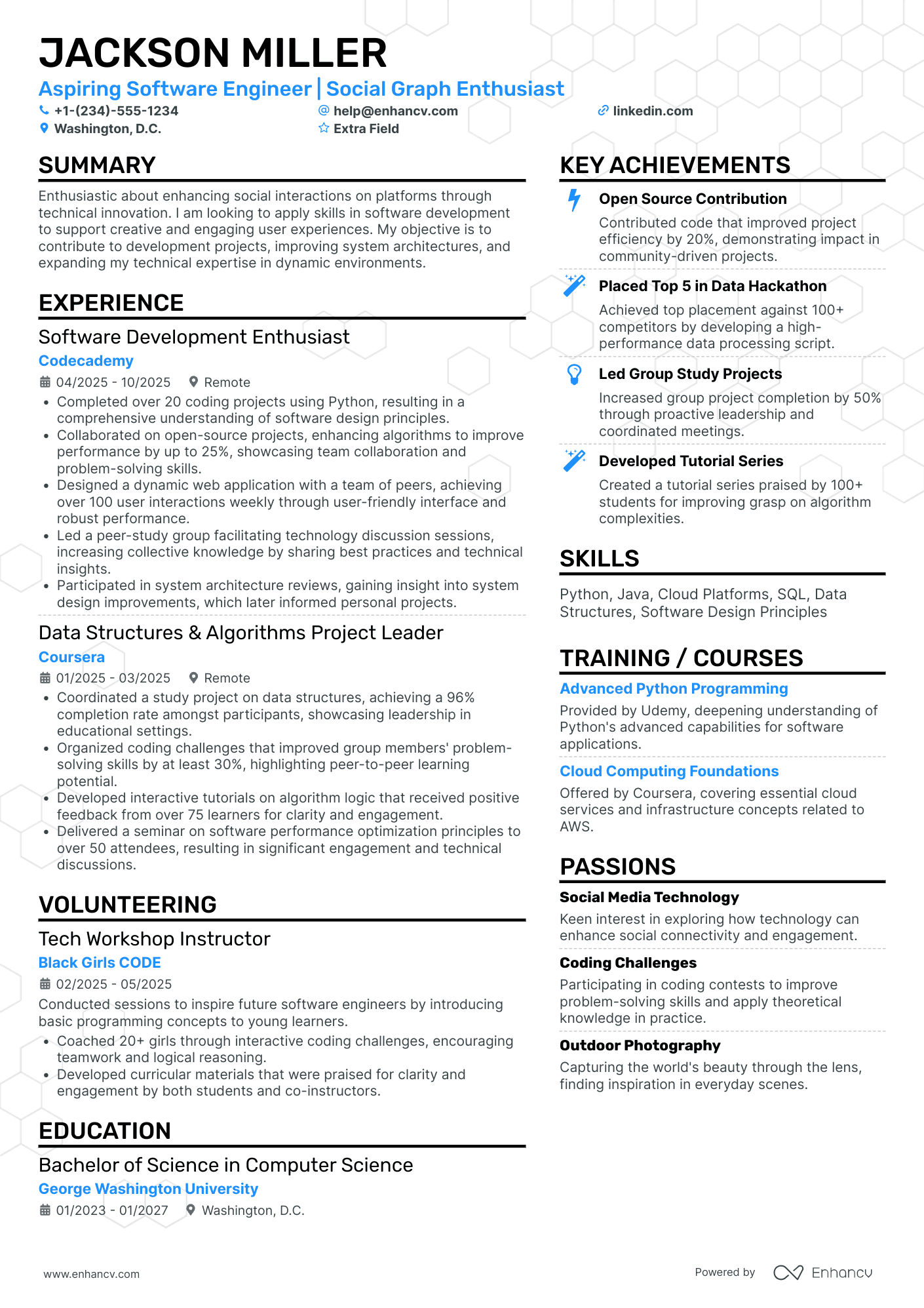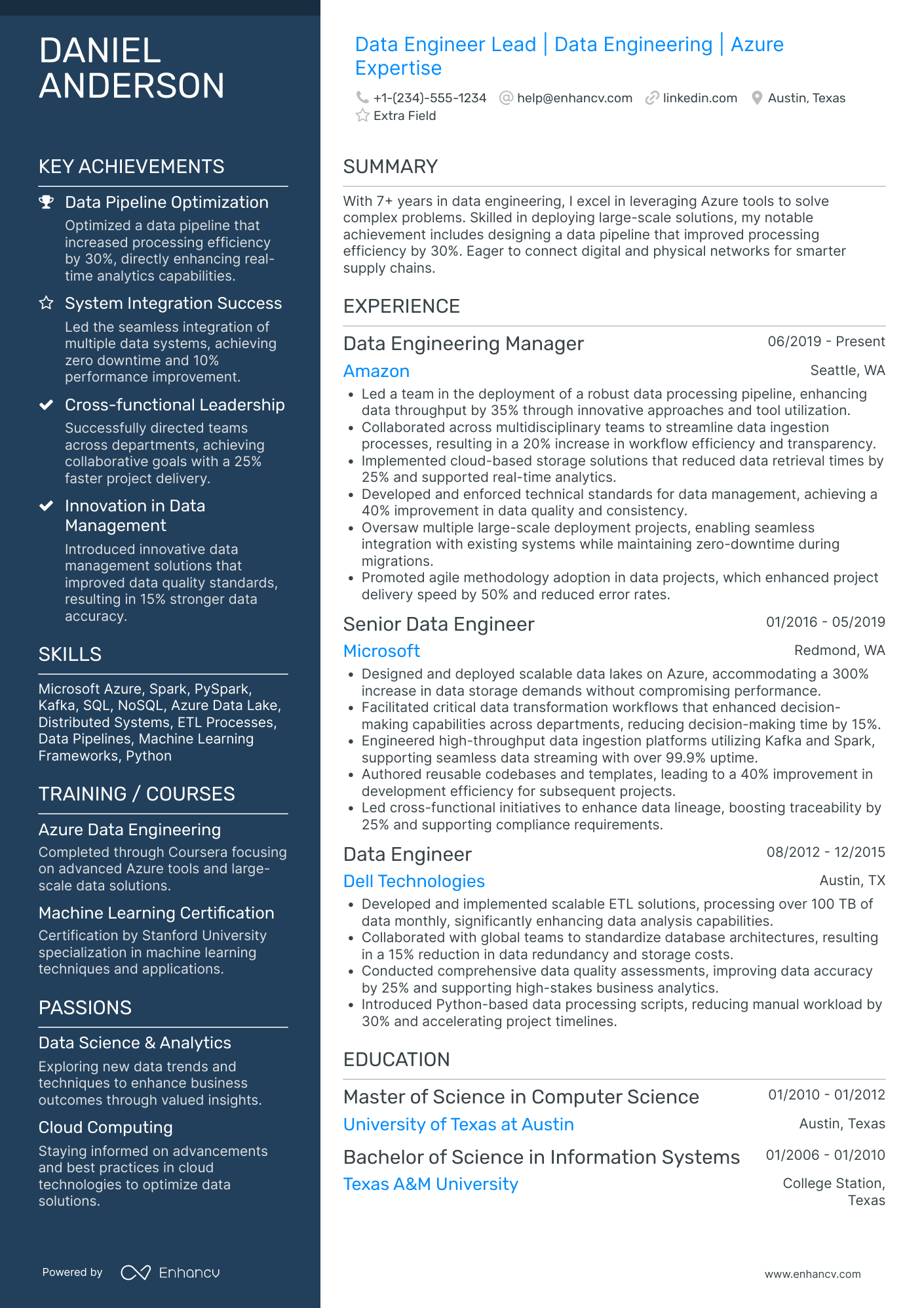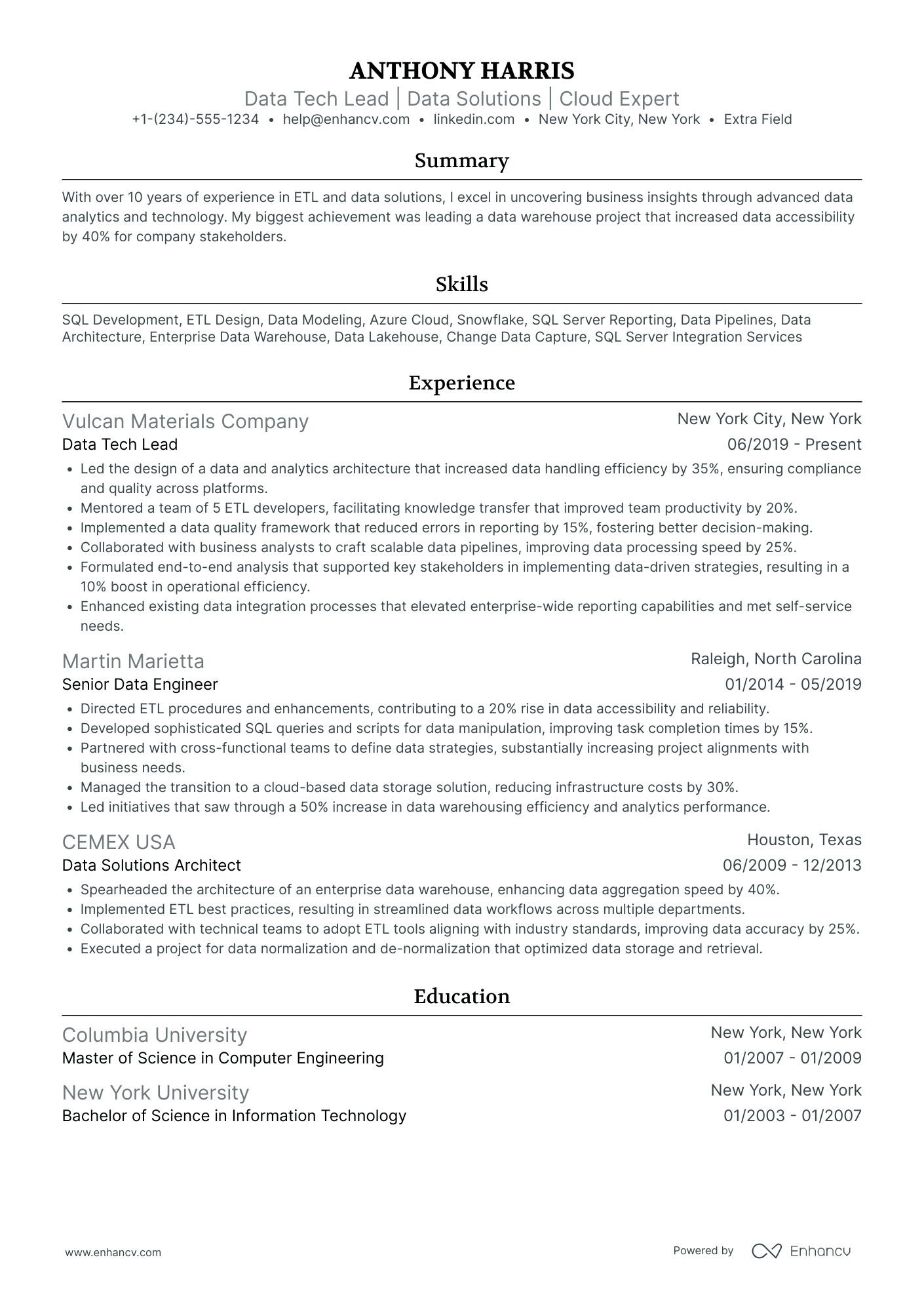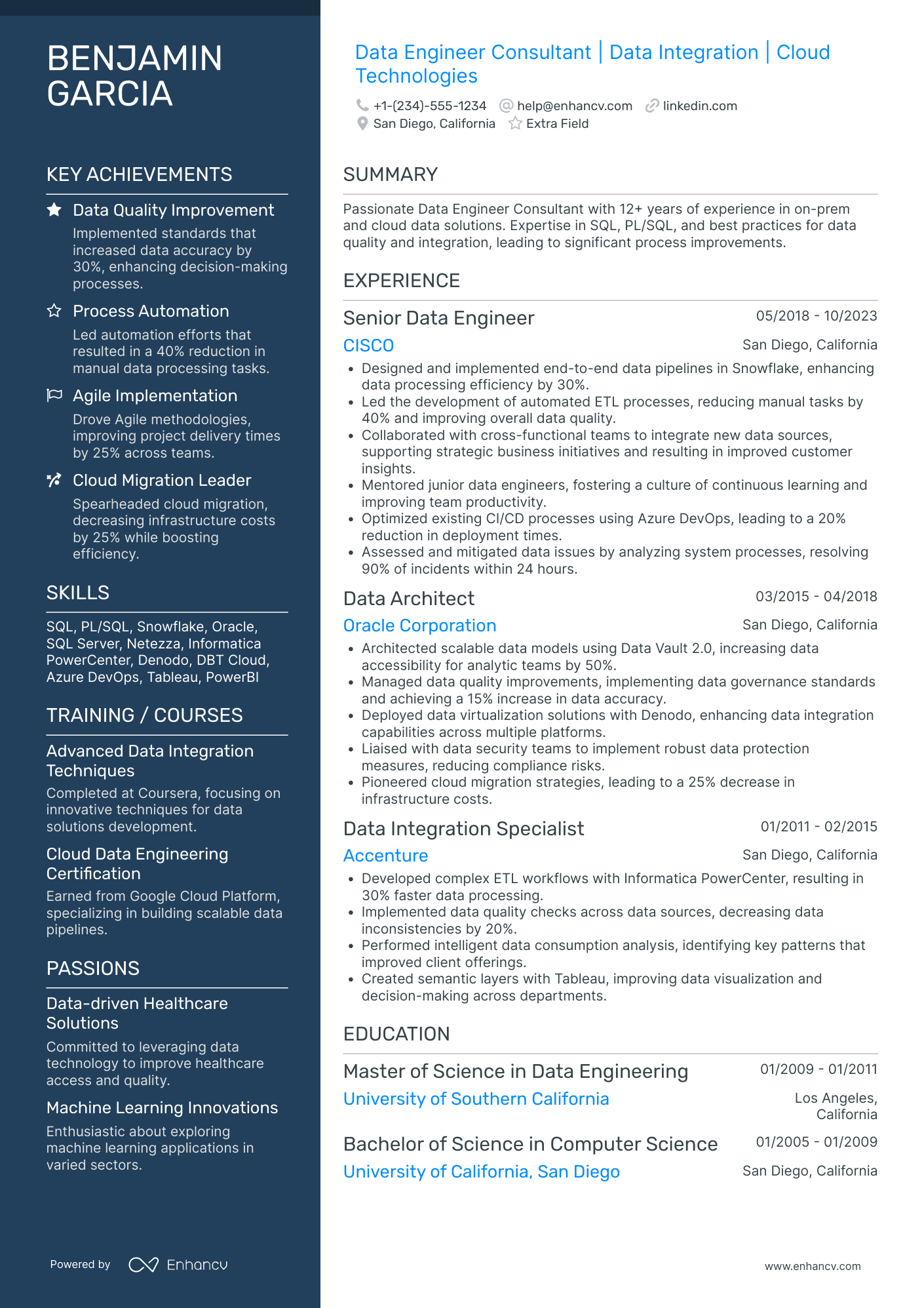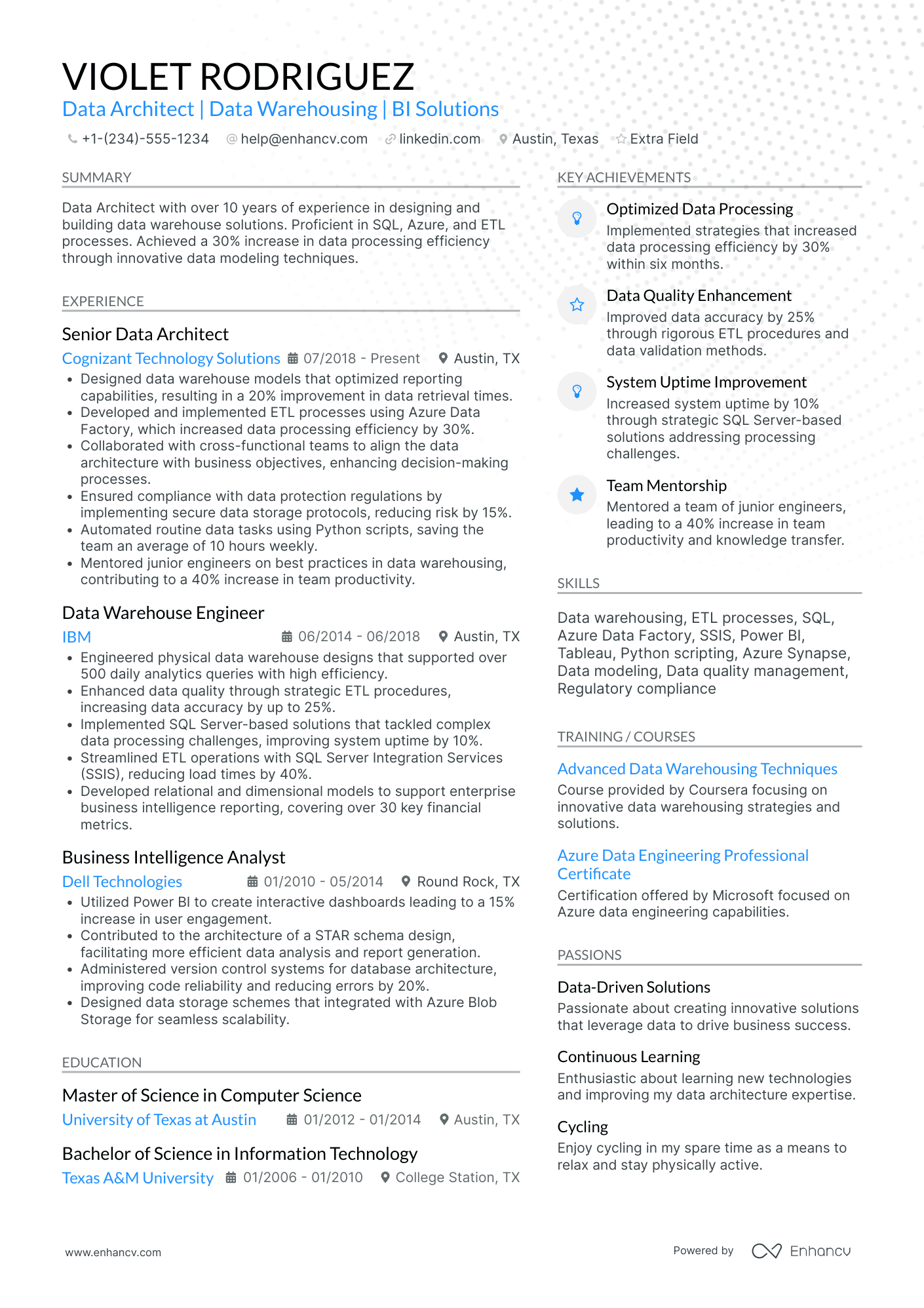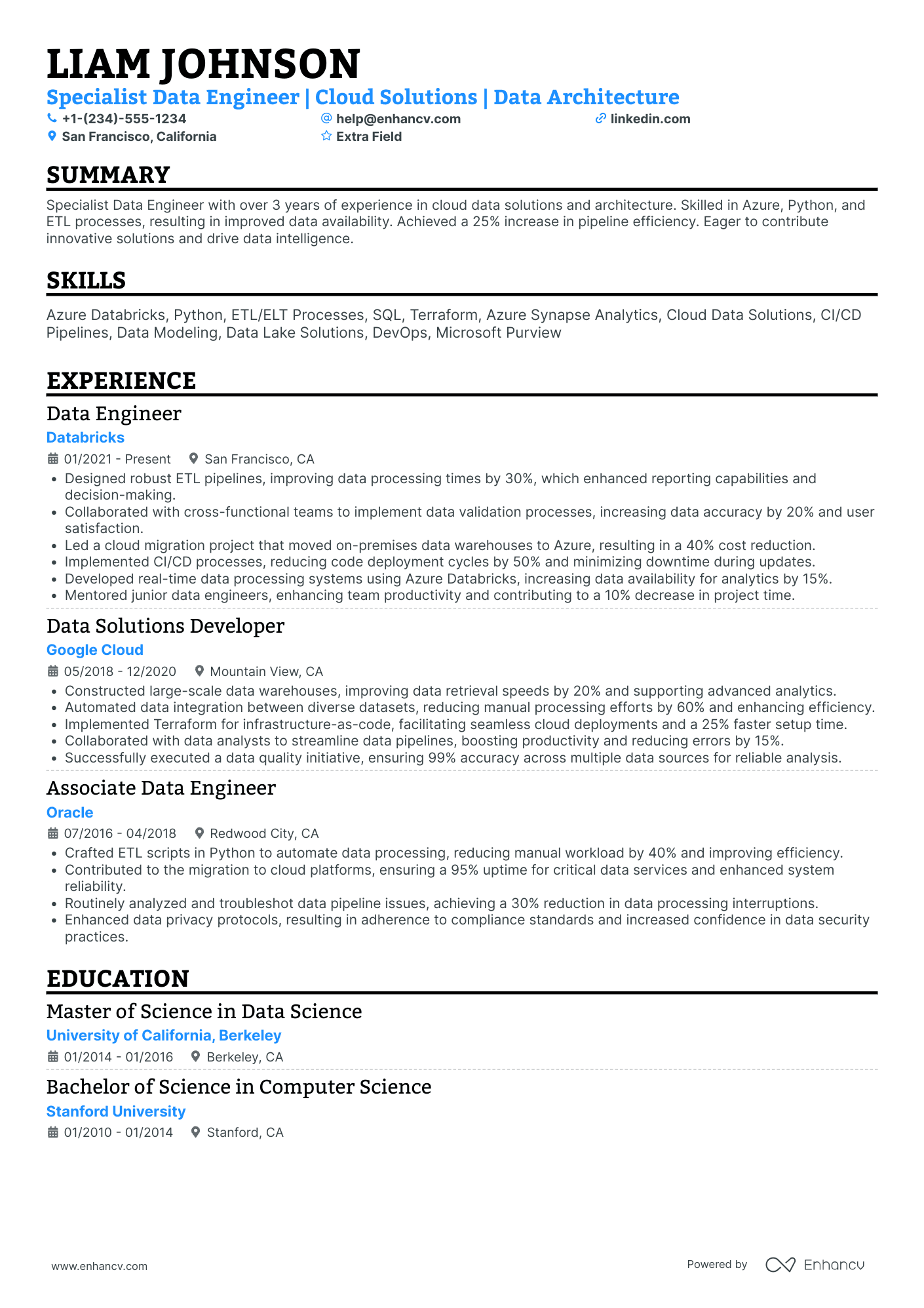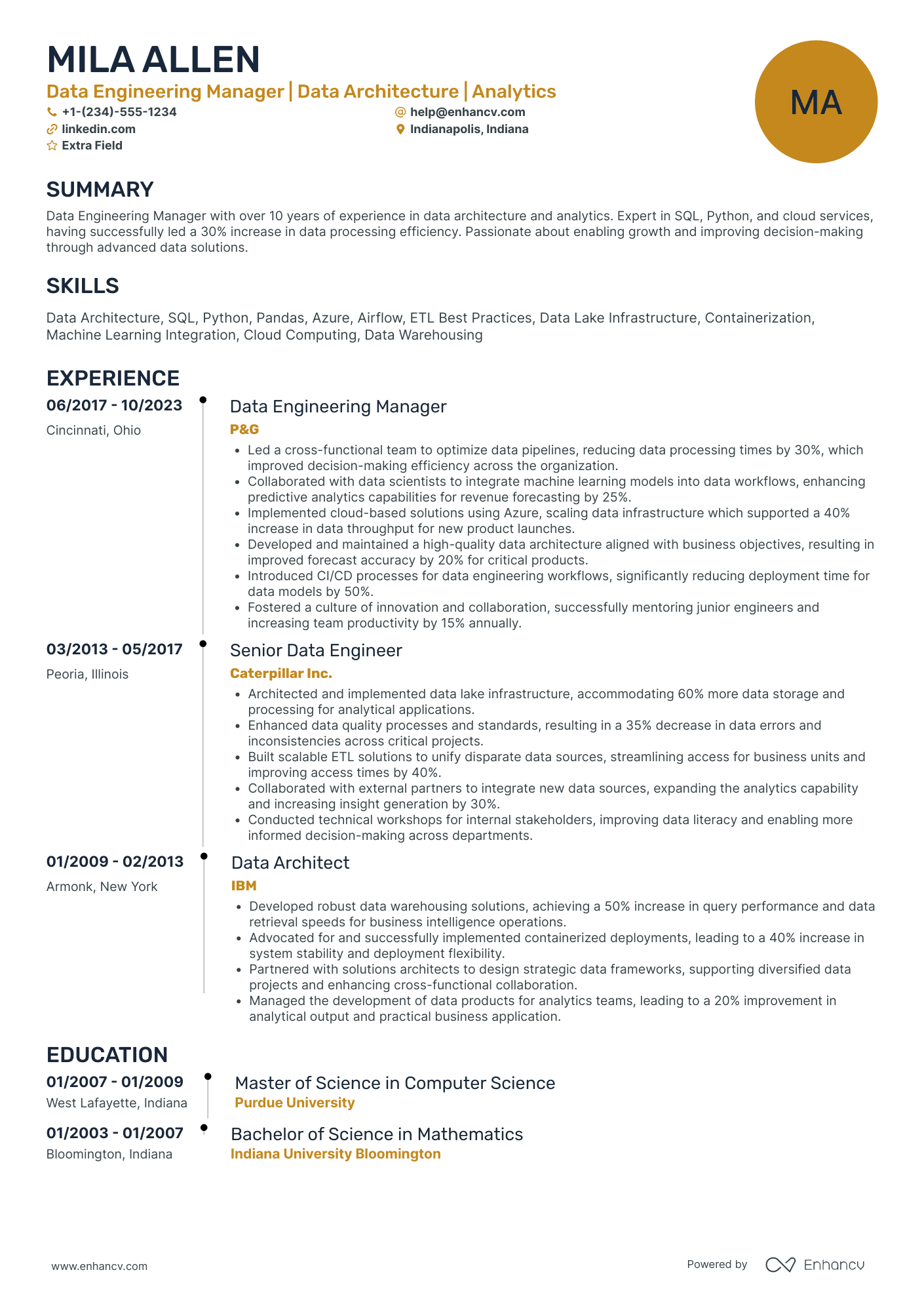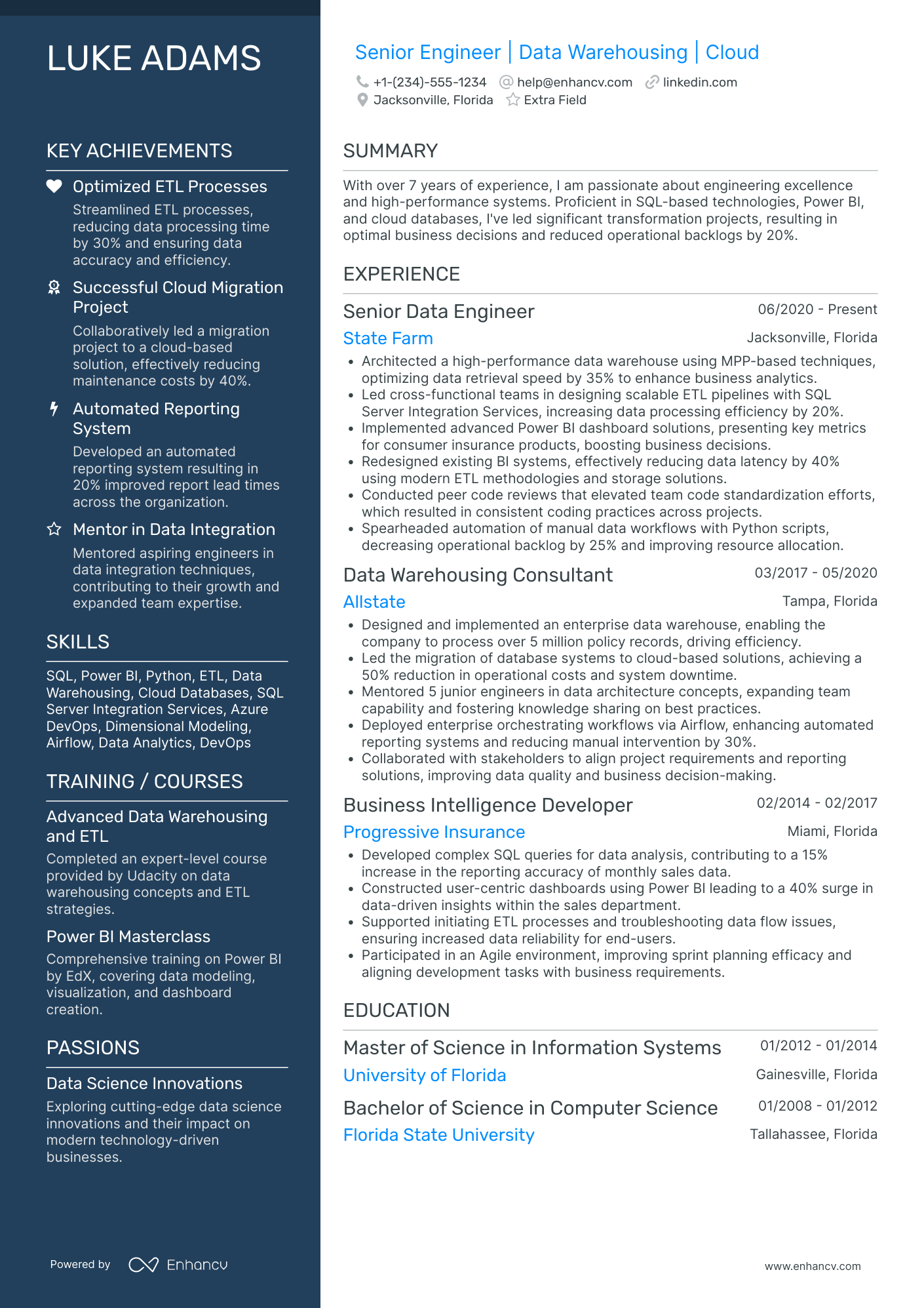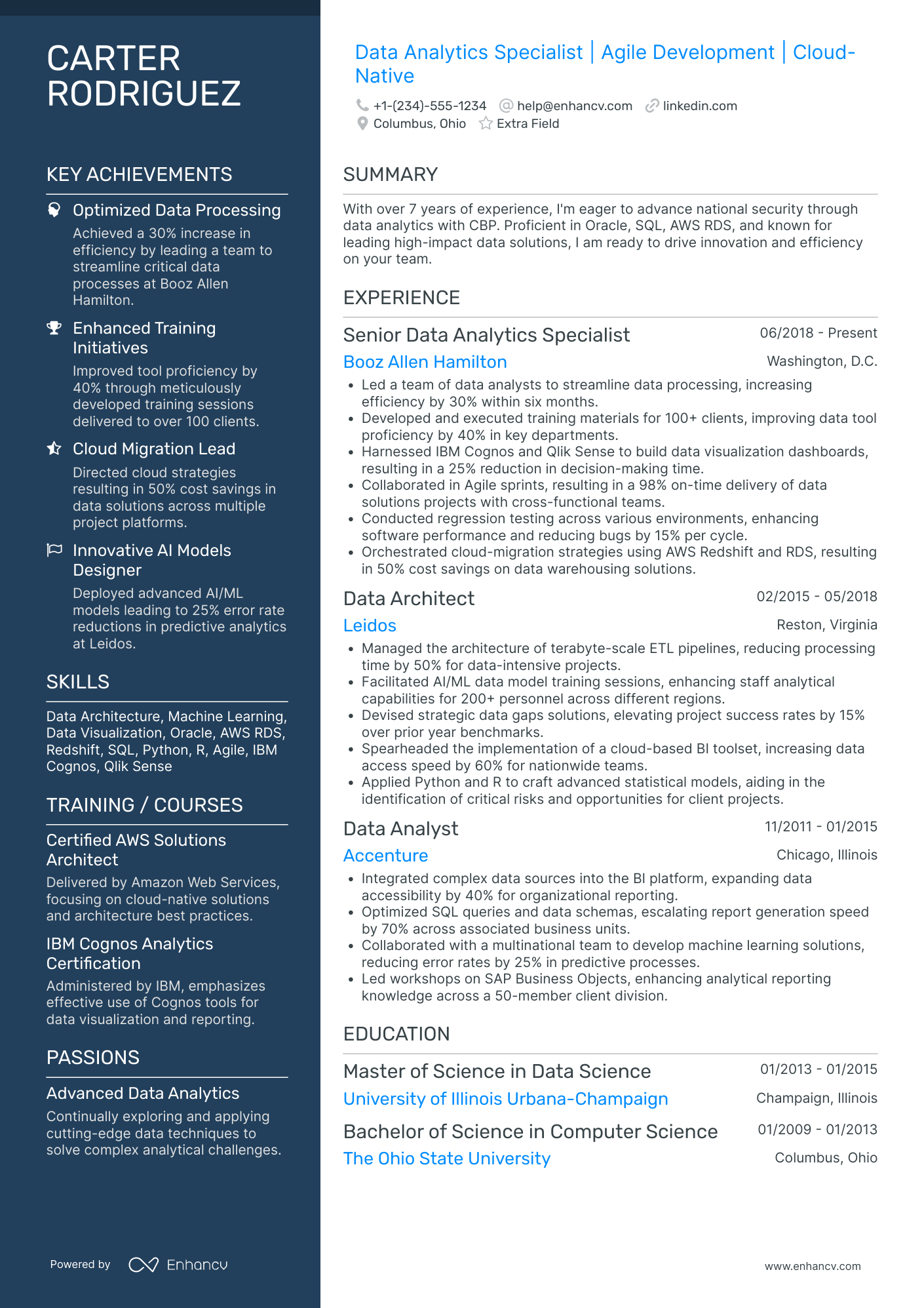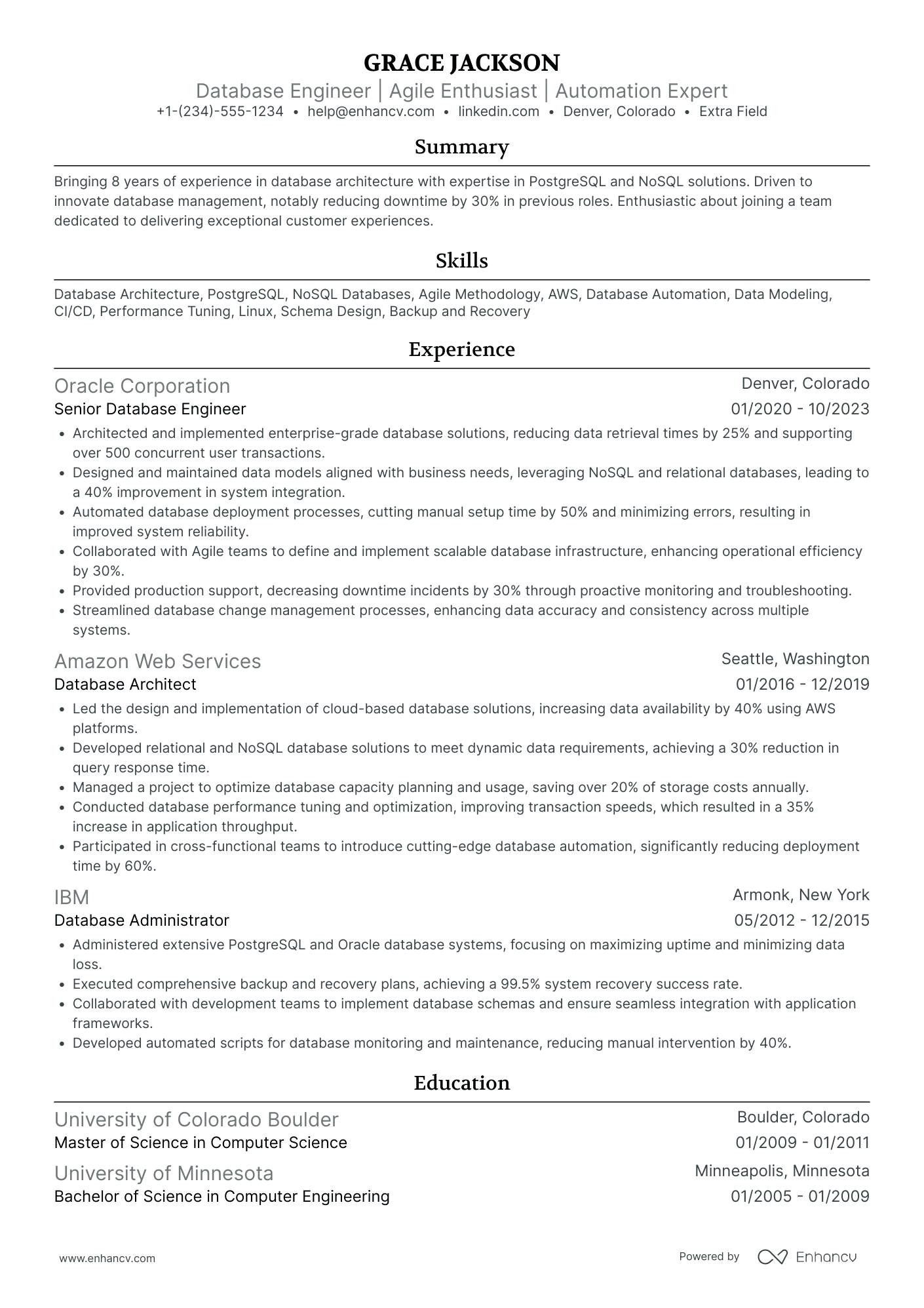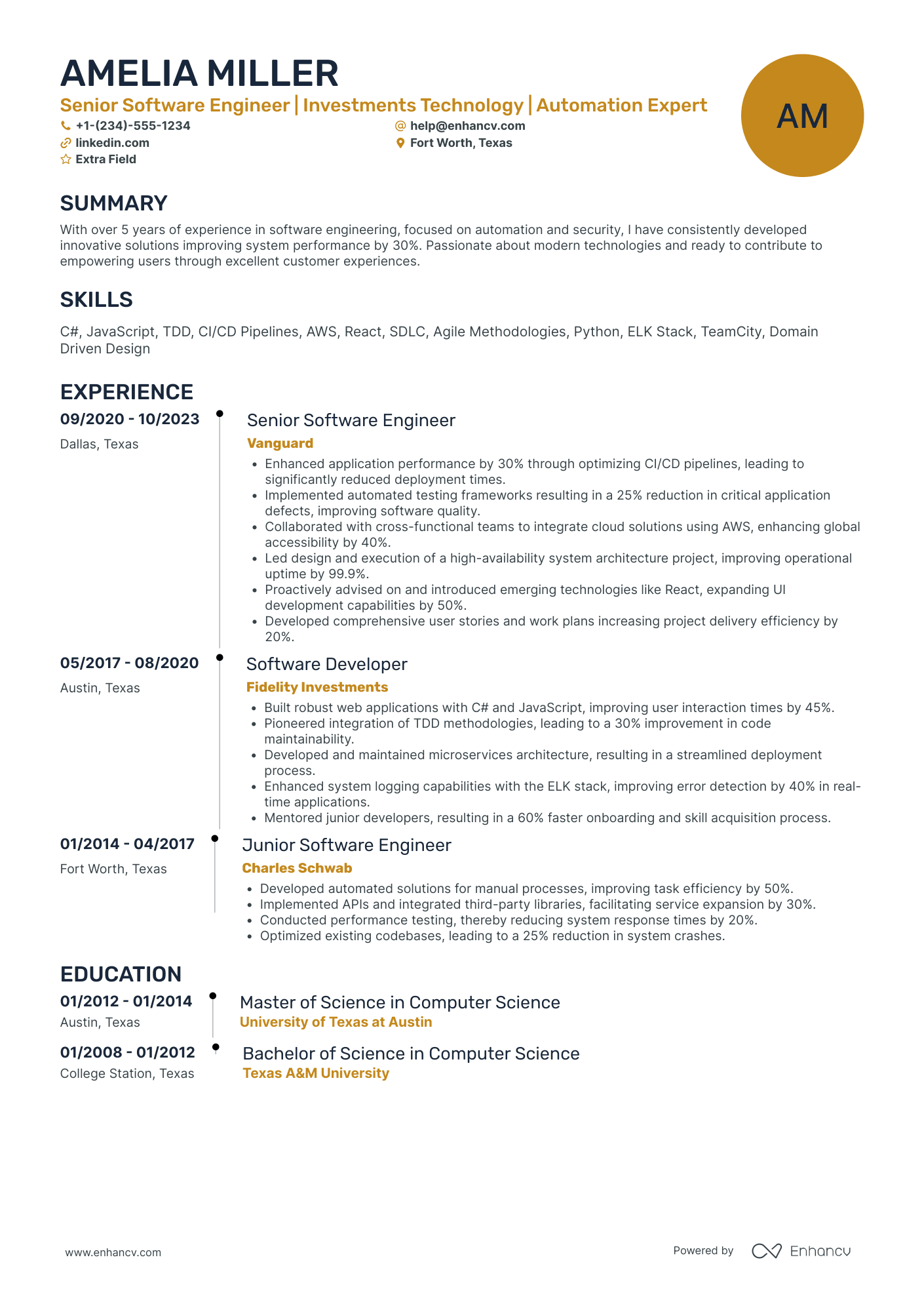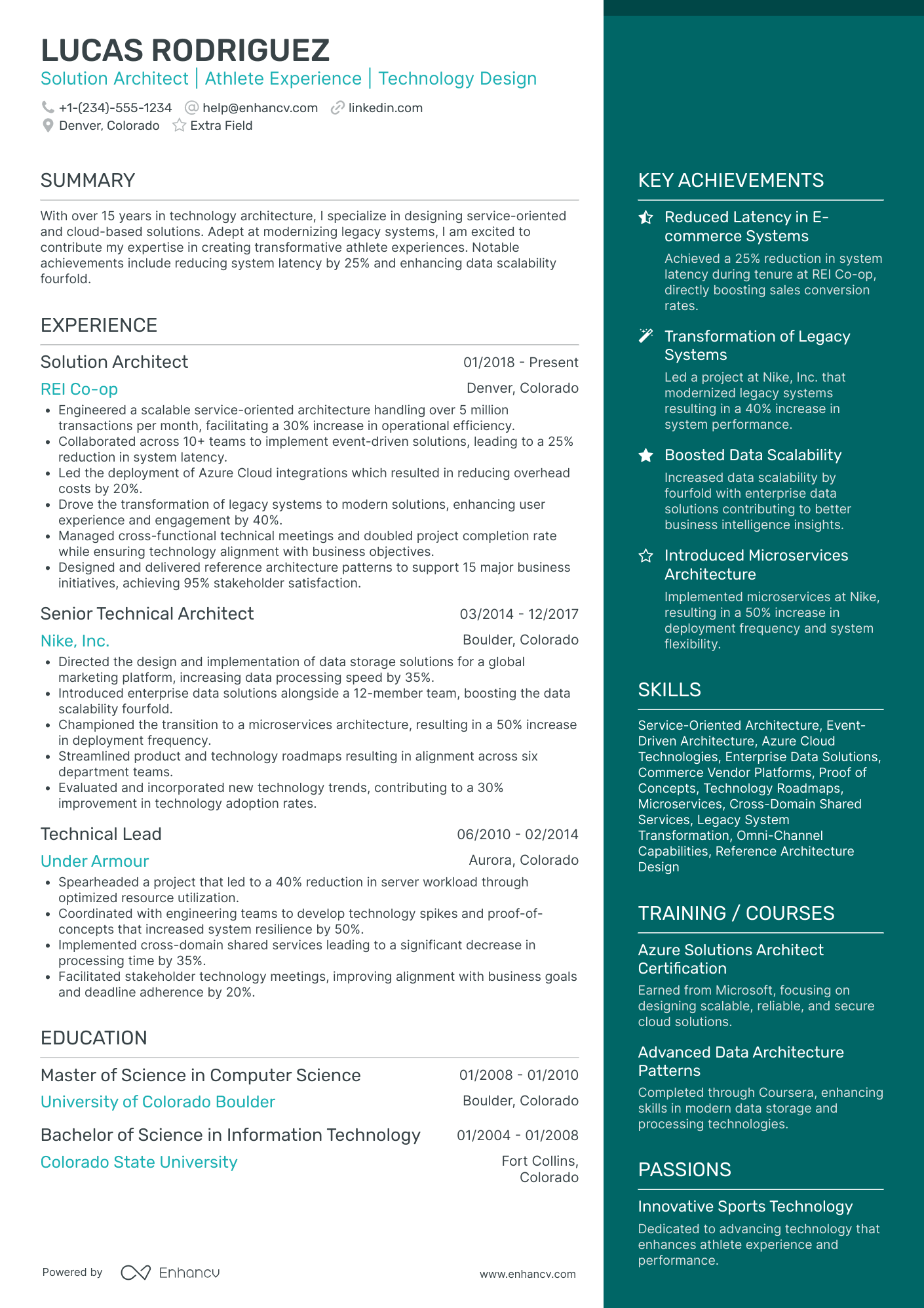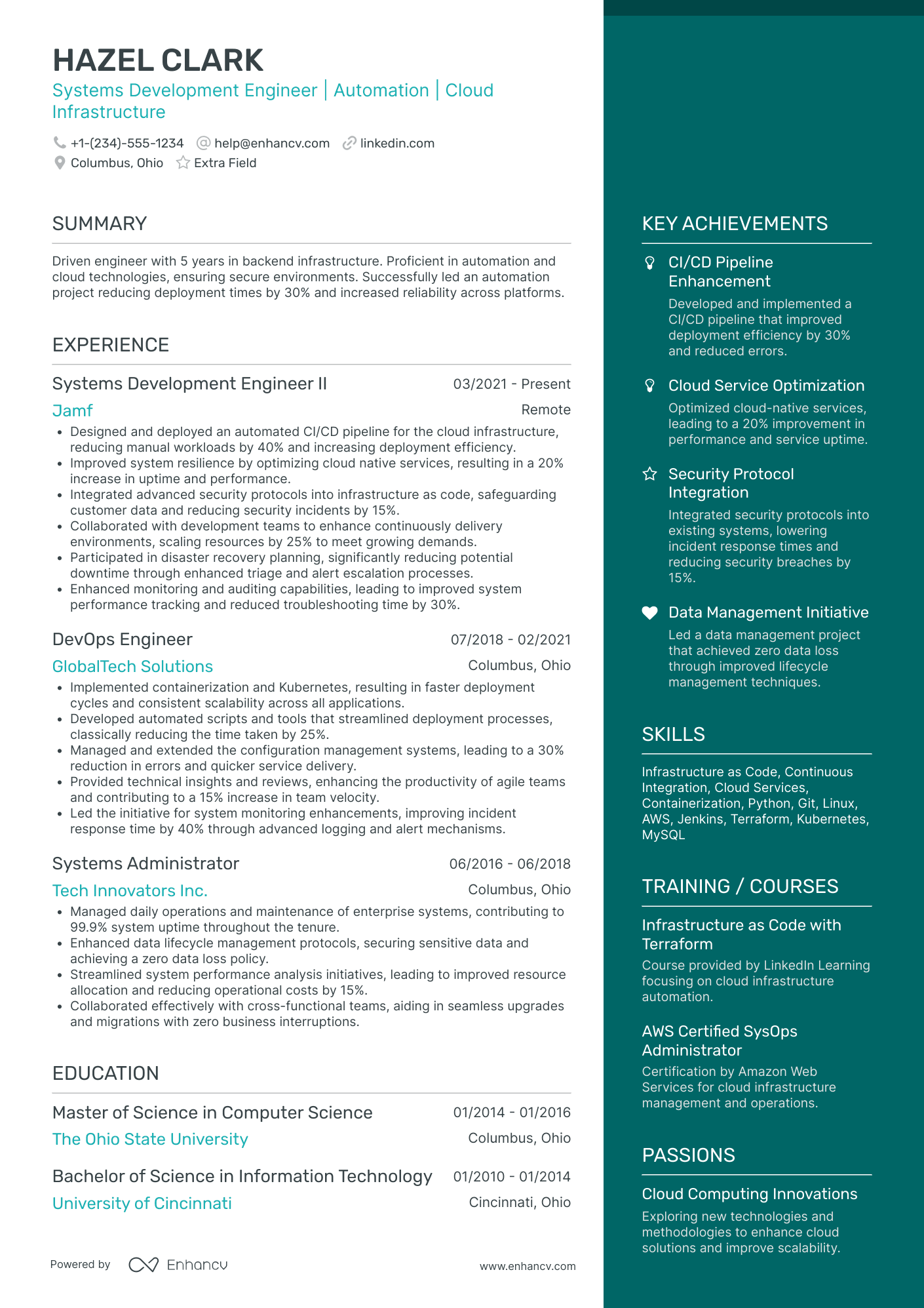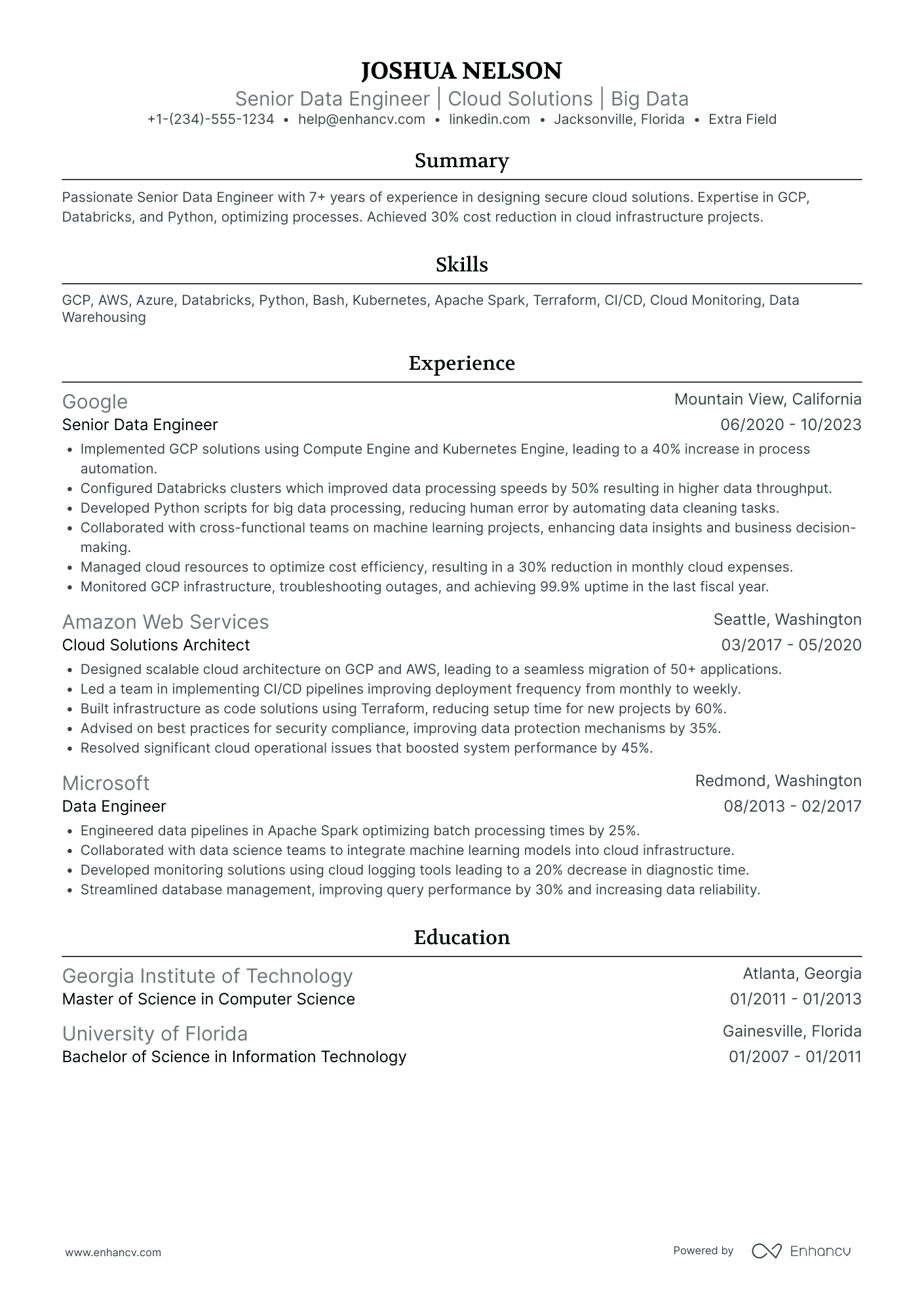As an Azure data engineer, articulating the depth of your technical skills and project experiences on a resume can be challenging, especially when trying to stand out in a competitive job market. Our guide will provide you with targeted advice on how to effectively showcase your expertise and accomplishments, ensuring that you capture the attention of potential employers.
- Which sections do you need to include in your resume to meet recruiters' requirements;
- How to write your Azure data engineer resume experience section - even if you have don't have little to no work experience;
- Real-life professional examples to guide you how to write the most important Azure data engineer resume sections;
- Adding even more sections so your Azure data engineer resume stands out with professionalism and your personality.
We've also selected some of the best (and most relevant) resume guides for the Azure data engineer role you're applying for:
- Data Management Analyst Resume Example
- Excel Data Analyst Resume Example
- Clinical Data Analyst Resume Example
- Statistical Data Analyst Resume Example
- Data Architect Resume Example
- Database Assistant Resume Example
- Healthcare Data Analyst Resume Example
- Data Warehouse Engineer Resume Example
- Data Warehouse Architect Resume Example
- Enterprise Data Architect Resume Example
Best practices for the look and feel of your Azure data engineer resume
Before you even start writing your Azure data engineer resume, first you need to consider its layout and format.
What's important to keep in mind is:
- The reverse-chronological resume is the most widely used format to present your experience, starting with your latest job.
- Your Azure data engineer resume header needs to include your correct, professional contact details. If you happen to have a professional portfolio or an updated LinkedIn profile, include a link to it.
- Ensure your resume is no longer than two pages - you don't have to include irelevant experience on your resume just to make it look longer.
- Unless specified otherwise, submit your resume in the most popular format, the PDF one, as this will ensure your Azure data engineer resume isn't altered.
Consider your target market – resumes in Canada, for example, follow different layout conventions.
Upload & Check Your Resume
Drop your resume here or choose a file. PDF & DOCX only. Max 2MB file size.
PRO TIP
List all your relevant higher education degrees within your resume in reverse chronological order (starting with the latest). There are cases when your PhD in a particular field could help you stand apart from other candidates.
The key to your Azure data engineer job-winning resume - present your expertise with these sections:
- A header to make your resume more scannable
- Snapshot of who you are as a professional with your resume soft skills, achievements, and summary or objective
- Job advert keywords in the skills section of your resume
- Resume experience quantifying your past job successes with metrics
- A relevant education, certification, and technical sills section to provide background to your technological/software capabilities
What recruiters want to see on your resume:
- Experience designing, building, and maintaining data architecture on Azure, including services like Azure Data Lake, Azure SQL Data Warehouse/Synapse Analytics, and Azure Databricks.
- Proficiency in developing data pipelines using Azure Data Factory or similar ETL tools.
- Strong understanding of data modeling, data partitioning, and data storage best practices specific to Azure cloud services.
- Knowledge and implementation of data security and compliance measures on Azure, integrating Azure Active Directory, and using Azure Key Vault.
- Demonstrated experience with Azure analytics tools such as Azure Analysis Services and Power BI for creating actionable insights from data.
Defining your professional expertise in your Azure data engineer resume work experience section
The work experience section, often the most detailed part of your resume, is where you discuss your past roles and achievements. To effectively list your experience, consider these four key tips:
- Align your expertise with the job requirements. It's vital to integrate keywords matching the job criteria to pass initial assessments;
- Show, don’t just tell. Quantify your responsibilities by stating your actual achievements in previous roles;
- Include measurable metrics. For instance, how did your performance impact the annual ROI?
- Highlight crucial industry skills. Mention both technological knowledge and interpersonal skills in this section.
These guidelines will help you craft an impressive Azure data engineer resume work experience section that is bound to catch recruiters' attention.
- Led the migration of on-premises SQL databases to Azure SQL Database, reducing operational costs by 30% and improving scalability.
- Developed and maintained ETL pipelines using Azure Data Factory, processing over 5 TB of data daily with a 99.9% success rate.
- Implemented real-time data analytics solutions using Azure Stream Analytics, serving over 100 internal users and empowering data-driven decision making.
- Architected a secure data lake solution in Azure, integrating multiple data sources, which supported advanced analytics and machine learning models.
- Optimized data warehousing costs by devising a multi-tier storage strategy, effectively saving the company over 25% in data storage expenses.
- Established robust data governance practices, enhancing data quality and compliance for key financial reporting datasets.
- Designed and implemented predictive analytics solutions on Azure, increasing customer retention rates by 18% through targeted insights.
- Automated data migration pipelines, which reduced manual efforts by 60% and enhanced the reliability of critical business operations.
- Pioneered use of Azure Databricks for complex data transformation and analytics, accelerating data processing times by over 50%.
- Implemented data flow automation using Azure Logic Apps, increasing operational efficiency by 40% for time-sensitive financial reporting.
- Collaborated with cross-functional teams to support a cloud data integration project that resulted in a unified customer view, enhancing marketing campaign success by 22%.
- Built and deployed machine learning models using Azure ML Studio, improving product recommendation engines and boosting online sales by 15%.
- Developed Azure-based BI solutions, enabling real-time business intelligence and reporting capabilities, leading to a 12% improvement in operational decision-making speed.
- Spearheaded database consolidation efforts in Azure, resulting in reduced redundancy and a 20% cost saving on database maintenance.
- Cultivated a data-driven culture by training non-technical staff on Power BI tools, which increased user engagement and self-service analytics adoption by 35%.
- Created a secure and compliant multi-region database deployment on Azure, ensuring 100% alignment with data sovereignty requirements.
- Streamlined data processing workflows with Azure Functions, reducing batch processing windows by 25% for critical nightly jobs.
- Enabled business continuity during critical migrations by establishing seamless data replication across Azure regions, ensuring zero downtime.
- Deployed a centralized data platform on Azure, facilitating improved data sharing across global teams and contributing to a 10% uptick in cross-departmental projects.
- Innovated a custom monitoring solution for Azure SQL Data Warehouse, improving performance visibility and aiding in a 5% increase in query speeds.
- Developed comprehensive disaster recovery strategies for Azure-based data stores, significantly reducing potential data loss risk.
- Designed secure and scalable data solutions on Azure, facilitating the ingest, storage, and analysis of over 2 billion transactions monthly.
- Drove a company-wide initiative optimizing data lake query performance, resulting in a 40% reduction in average query execution time.
- Coordinated with business analysts to translate complex requirements into functional Azure-based analytics systems, enhancing reporting capabilities and executive insight.
Quantifying impact on your resume
- Include the amount of data you have managed or migrated, to show experience with large-scale data operations.
- List any cost savings achieved through optimization of data storage or processing, to demonstrate financial impact.
- Detail the percentage increase in data processing speed or efficiency, to highlight performance improvements.
- Mention the number of data pipelines or ETL processes you have developed, to indicate proficiency with data integration.
- Quantify downtime reductions achieved through your solutions, to show reliability and maintenance improvements.
- Describe the growth in data accessibility or reporting capabilities, to reveal enhancements in data democratization.
- State the number of cloud-based data services you have implemented, to display expertise in modern data solutions.
- Document any increases in data security compliance standards met, to emphasize commitment to data governance.
Action verbs for your Azure data engineer resume
What if my Azure data engineer experience doesn't match the requirements?
You've just graduated from college and may have no real world job experience . What should you include within your resume then?
Instead of making up information or adding irrelevant past jobs (e.g. your on-campus work during freshman year), you can:
- Shift the focus from your professional experience to your community impact with your volunteer work. This would showcase numerous soft skills you've built over time (e.g. interpersonal communication);
- Highlight the projects you've completed, as part of your coursework, or, on your own. Thus, you will align your technical background with recruiters' requirements;
- Consider spotlighting your transferrable skills. Or, what lessons and talents your current professional and personal experience has taught you and how they could benefit your potential employers;
- Even if you've had a few months of internship experience, that is relevant for the role, make sure to include this. Recruiters do care about the years of experience you happen to have, but, at the end of the day, your profile would also be assessed based on role alignment.
Recommended reads:
PRO TIP
The more trusted the organization you've attained your certificate (or degree) from, the more credible your skill set would be.
The right balance between hard skills and soft skills for your Azure data engineer resume
Wondering what the perfect Azure data engineer resume looks like? The candidate's profile meets job requirements by balancing both hard skills and soft skills across their resume.
- Hard skills are all the technologies you're apt at using . Prove you have the right technical background by listing key industry hardware/software in your Azure data engineer resume skills section and noteworthy certifications.
- Soft skills are both your personal, mindset, communication, analytical, and problem-solving talents . Use your Azure data engineer resume achievements section to show how you've used a particular soft skill to reach a tangible outcome.
When writing about your unique skill set, always make sure to refer back to the job advert to see what are the key requirements. This ensures you've tailored your resume so that it matches closer to what the ideal candidate profile is.
Top skills for your Azure data engineer resume:
Azure Data Factory
Azure SQL Database
Azure Synapse Analytics
Azure Databricks
Data Lake Storage
SQL Server
Power BI
ETL Processes
Data Modeling
Azure Stream Analytics
Problem-Solving
Communication
Team Collaboration
Time Management
Analytical Thinking
Adaptability
Attention to Detail
Critical Thinking
Project Management
Creativity
PRO TIP
If you happen to have some basic certificates, don't invest too much of your Azure data engineer resume real estate in them. Instead, list them within the skills section or as part of your relevant experience. This way you'd ensure you meet all job requirements while dedicating your certificates to only the most in-demand certification across the industry.
Education section and most popular Azure data engineer certifications for your resume
Your resume education section is crucial. It can indicate a range of skills and experiences pertinent to the position.
- Mention only post-secondary qualifications, noting the institution and duration.
- If you're still studying, highlight your anticipated graduation date.
- Omit qualifications not pertinent to the role or sector.
- If it provides a chance to emphasize your accomplishments, describe your educational background, especially in a research-intensive setting.
Recruiters value Azure data engineer candidates who have invested their personal time into their professional growth. That's why you should include both your relevant education and certification . Not only will this help you stand out amongst candidates, but showcase your dedication to the field. On your Azure data engineer resume, ensure you've:
- Curated degrees and certificates that are relevant to the role
- Shown the institution you've obtained them from - for credibility
- Include the start and end dates (or if your education/certification is pending) to potentially fill in your experience gaps
- If applicable, include a couple of job advert keywords (skills or technologies) as part of the certification or degree description
If you decide to list miscellaneous certificates (that are irrelevant to the role), do so closer to the bottom of your resume. In that way, they'd come across as part of your personal interests, instead of experience. The team at Enhancv has created for you a list of the most popular Azure data engineer certificates - to help you update your resume quicker:
The top 5 certifications for your Azure data engineer resume:
- Microsoft Certified: Azure data engineer Associate (DP-203) - Microsoft
- Microsoft Certified: Azure Fundamentals (AZ-900) - Microsoft
- Microsoft Certified: Azure Data Scientist Associate (DP-100) - Microsoft
- Microsoft Certified: Azure AI Engineer Associate (AI-102) - Microsoft
- Microsoft Certified: Data Analyst Associate (DA-100) - Microsoft
PRO TIP
Always remember that your Azure data engineer certifications can be quantified across different resume sections, like your experience, summary, or objective. For example, you could include concise details within the expertise bullets of how the specific certificate has improved your on-the-job performance.
Recommended reads:
The summary or objective: focusing on the top one-third of your resume
It's a well-known fact that the top one-third of your Azure data engineer resume is the make-it-or-break-it moment of your application. The resume summary and objective could help you further build up your professional profile.
- If you have plenty of career highlights behind your back, use the resume summary . The Azure data engineer summary immediately focuses recruiters' attention on what matters most within your experience.
- The resume objective is the perfect choice for balancing your career achievements with your vision. Use it to state precisely how you see yourself in a couple of years' time - as part of the company you're applying for.
Both the resume summary and resume objective can be your value pitch to potential employers: answering what makes your application unique and the top choice for the Azure data engineer role. They both have to be specific and tailored - as there's no one-size-fits-all approach to writing your Azure data engineer summary or objective. Use the Azure data engineer examples below as a starting point:
Resume summaries for a Azure data engineer job
- Seasoned Azure data engineer with over 8 years of experience in developing scalable data warehousing solutions, adept in utilizing Azure Data Factory, Azure SQL Database, and Data Lake storage. Recognized for driving a 20% improvement in data processing efficiency at TechSolutions Global by implementing cloud data orchestration best practices.
- Dedicated IT professional transitioning to an Azure data engineer role, bringing 5 years of experience in system administration and a deep proficiency with PowerShell scripting. Proven problem-solving skills and a passion for optimizing data flow and storage will be instrumental in designing robust cloud data architectures.
- Former Business Analyst pivoting to Azure data engineering, leveraging 6 years of experience in data analytics and visualization tools like Tableau. Bringing forth strong analytical skills and a solid foundation of SQL, eager to contribute to high-impact projects in data warehousing and pipeline development.
- Dynamic newcomer to Azure data engineering with a recent certification in Azure fundamentals and a Bachelor’s degree in Computer Science. Eager to apply a fresh perspective and a strong foundation in cloud concepts to design and implement effective data solutions that meet the complex needs of modern enterprises.
- Embarking on an Azure data engineering career, I am freshly equipped with a master's degree in data science and an Azure data engineer Associate certification. My objective is to leverage my academic knowledge and recent internship experience to contribute to the creation of innovative and efficient data processing pipelines.
- Aspiring Azure data engineer aiming to apply a strong background in data analytics and a successful track record of designing SQL databases from my 4 years at ByteAnalytics. My objective is to harness my data management expertise to build scalable cloud data platforms that drive strategic decision-making.
Optimize your resume summary and objective for ATS
Drop your resume here or choose a file.
PDF & DOCX only. Max 2MB file size.
Taking your Azure data engineer resume to the next level with these four additional resume sections
Your Azure data engineer resume can feature a variety of skills (both hard and soft) in diverse sections. Choose those that align best with the job requirements and reflect your suitability for the company culture.
Consider these four additional resume sections recommended by our experts:
- Languages - State any languages you are proficient in and your level of proficiency. This demonstrates your commitment to communication and potential for international growth.
- Projects - Highlight up to three significant projects you've completed outside of work, showcasing skill development. Include a link to your project portfolio in the Azure data engineer resume header, if applicable.
- My Time - How you allocate your time outside work can indicate your organizational skills and cultural fit within the company.
- Volunteering - Detail causes you're passionate about, roles you've held, and achievements in volunteering. Such experiences likely have honed a range of soft skills crucial for your dream job.
Key takeaways
- The layout of your resume should take into consideration your professional background while integrating vital sections and design elements;
- Highlight your most pertinent achievements for the role all through different sections;
- Be very specific when selecting your certifications, hard skills, and soft skills to showcase the best of your talents;
- Include within the top one-third of your Azure data engineer resume a header and summary to help recruiters understand your experience and allocate your contact details. A skills box is optional, but it will help you align your expertise with the role;
- Detail the full extent of your professional experience with specific bullets that focus on tasks, actions, and outcomes.
Azure Data Engineer resume examples
By Experience
Junior Azure Data Engineer
Senior Azure Data Engineer
Lead Azure Data Engineer
Azure Data Engineer Intern
Azure Data Engineer Team Lead
Azure Data Engineer Technical Lead
By Role
